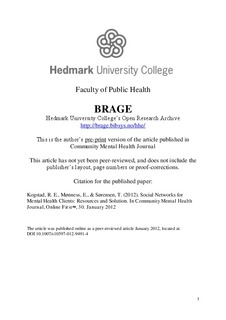Social Networks for Mental Health Clients: Resources and Solution
Journal article, Peer reviewed
Permanent lenke
http://hdl.handle.net/11250/134378Utgivelsesdato
2012Metadata
Vis full innførselSamlinger
Originalversjon
Kogstad, R. E., Mønness, E., & Sørensen, T. (2012). Social Networks for Mental Health Clients: Resources and Solution. In Community Mental Health Journal 44(1). Publisert online 2012 på: http://www.springerlink.com/content/r088142300078157/fulltext.pdfSammendrag
Engelsk sammendrag (abstract): Background: Several studies have illustrated the importance of social support and social networks for persons with mental health problems. Social networks may mean a reduced need for professional services, but also help to facilitate access to professional help. The interplay between social networks and professional services is complicated and invites further investigation.
Aim: Compare aspects of clients’ experiences with social networks to experiences with professional services and learn about the relationship between network resources and help from the public health service system.
Method: Quantitative analyses of a sample of 850 informants.
Results: Supportive networks exist for a majority of the informants and can also be a substitute for public/professional services in many respects. Regarding help to recover, social networks may offer qualities equal to those of professional services. Furthermore, there is a positive relationship between trust in a social network and trust in public professional services. Trust in a social network also increases the probability of achieving positive experiences with professional services.
Conclusion: Our findings imply that more network qualities should be included in professional services, and also that professionals should assist vulnerable groups in building networks.
Beskrivelse
Dette er forfatters pre-print versjon av artikkelen. Artikkelen slik den foreligger her er ikke fagfellevurdert, og mangler forlagets layout, sidetall og siste korrekturrettelser. Publisert, fagfellevurdert artikkel finnes på: http://www.springerlink.com/content/r088142300078157/fulltext.pdf
